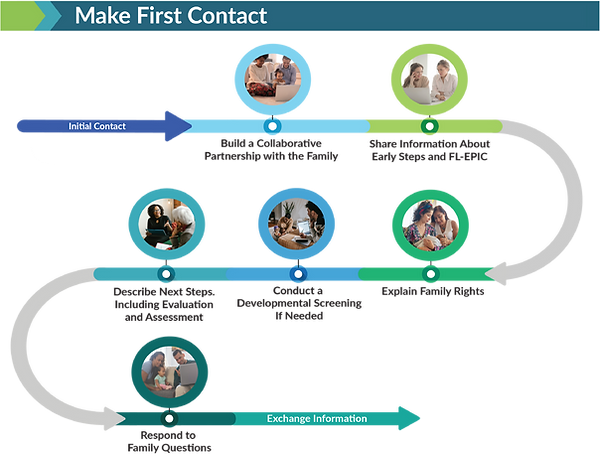
FLORIDA EARLY STEPS LEARNING CENTER

Learn More About First Contacts - Sharing Early Steps Principles and Practices
First Contact - Share Early Steps Principles and Practices






Build a Collaborative Partnership with the Family
First contact with families may occur in person with the family at home or in the community, by phone, or virtually. Before the first contact, the Service Coordinator should:
-
Plan with the family to meet in a way or place that is convenient for the family.
-
Discuss the purposes for and anticipated length of the first contact visit or call.
-
Review information about the family and child from their referral and initial contact so family members do not have to repeat the same information.
-
Let the family know they can choose what they would like to share and who they want to be involved.
During the first contact and throughout a family’s participation in the Early Steps Program, the Service Coordinator should:
-
Explain their roles as an Early Steps Service Coordinator, including:
-
Assist the family and child in accessing timely delivery of early intervention services and supports.
-
Coordinate and ensure the delivery of the family’s Early Steps supports and services.
-
Facilitate and participate in developing and overseeing the ongoing implementation of the family’s Individualized Family Support Plan (IFSP).
-
Help the family access information and resources and help coordinate services and supports, when necessary, throughout their participation in the Early Steps Program.
-
Provide information about Early Steps using words families can understand and use to make informed choices and decisions.
-
Show respect for families’ priorities, values, beliefs, and culture.
-
Actively listen to what family members say and seek clarification or additional information when needed.
Share Information about the Early Steps Program and FL-EPIC
What a Service Coordinator might share with families to introduce Early Steps:
-
Early Steps is Florida’s early intervention program offering supports and services for families of children aged birth to three who have or are at risk for developmental delays or disabilities.
-
Family members are key decision-makers in all services and supports they and their child receive.
-
Services and supports are flexible, individualized, and responsive to families’ and children’s current and future priorities, strengths, and preferences.
-
Early Steps providers enhance caregiver capacity by coaching caregivers to support their child’s development and learning during everyday routines.
What a Service Coordinator might share about what happens during an Early Steps visit:
-
When a child is eligible, an Early Steps provider will regularly visit and support caregivers to help their child learn skills during their everyday routines. This approach is called Florida Embedded Practices and Intervention with Caregivers (FL-EPIC).
-
Providers partner with families to identify daily routines--like meals, baths, or outdoor play--as times when caregivers can support their child to practice skills they want them to learn.
-
Caregivers and providers work together to identify and use strategies to help their child learn.
-
Families and caregivers will have the tools they need to support their child’s development and learning during routines between provider visits.
Explain Family Rights
During first contact, service coordinators will explain the Early Steps Program family rights and procedural safeguards. These rights and procedural safeguards help ensure that an IFSP is developed with family members as decision-makers and addresses their priorities and preferences for information and supports. Being informed and knowledgeable about their rights and responsibilities also helps families take an active role in identifying and obtaining supports and services for themselves and their children. Service Coordinators should give the family a copy of the Early Steps Summary of Family Rights in the family’s preferred language.
Conduct a Developmental Screening
A developmental screening is not required for every child. However, if the child does not have an established condition, an observed developmental delay, or a recent screening completed by a referral source or other community partner, conducting a developmental screening can:
-
Help determine the need for further evaluation.
-
Help plan for evaluation and assessment and identification of an appropriate team, if needed.
Developmental screening instruments recommended by the Early Steps Program include:
-
Ages and Stages Questionnaire, 3rd ed. (Squires et al., 2009)
-
Ages & Stages Questionnaires: Social-emotional, 2nd ed. (Squires et al., 2015)
-
Birth to Three Assessment and Intervention, 2nd ed. (BTAIS-2) Screening Test of Developmental Abilities (Ammer & Bangs, 2000)
-
Battelle Developmental Inventory Screening Test (Newborg, 2021, 2005)
-
Early Learning Accomplishment Profile (ELAP) Screener (Glover et al., 2002)
Describe Next Steps
Local Early Steps (LES) Programs gather information about a family’s and child’s routines, sources of support, and intervention priorities as part of their first contact with families and during the evaluation and IFSP development process. See Collaborate to Exchange Information for more resources related to exchanging information with families.
If the family chooses to move forward with determining whether their child is eligible for the Early Steps Program, the Service Coordinator will explain the evaluation and assessment processes and eligibility guidelines. The Service Coordinator will then organize the date and time of the evaluation and assessment based on the family’s preferences and availability.